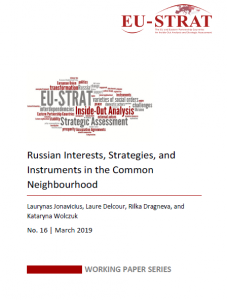EU-STRAT Working Paper No. 16 analyses Russia’s policy towards its neighbourhood, with a focus on the strategies, policies, and instruments adopted in relation to EaP countries, particularly Belarus, Ukraine, and Moldova.
Click on the title or the picture below to download the PDF.
Title: Russian Interests, Strategies, and Instruments in the Common Neighbourhood
Author: Laurynas Jonavicius, Laure Delcour, Rilka Dragneva and Kataryna Wolczuk
Abstract:
 The paper analyses the peculiarities of the Russian Federation’s foreign policy towards the so-called post-soviet countries. It focuses on Russia’s policies towards Belarus, Ukraine, Moldova, and the South Caucasus, with specific attention on how a complexity of foreign policy players, diverse available tools, and geopolitical as well as ideational, economic, and cultural interests are combined into a coherent strategy. The paper argues that despite common strategic goals – geopolitical security and Great Power identity – the interests of powerful domestic players hinder the creation of a consistent and long-term plan for how to achieve strategic goals. The domestic institutional logic of Russia as a Limited Access Order (LAO) creates significant obstacles for long-term planning and makes Russian policy in the post-soviet space tactical rather than strategic. The existing patterns of asymmetrical economic, political, and cultural interdependence of neighbouring countries with Russia allows Moscow to achieve short-term victories. These victories are, however, mainly determined by the rigid use of hard power tools, which in the long run reduces Russia’s attractiveness and forces neighbouring countries to look for alternatives.
The paper analyses the peculiarities of the Russian Federation’s foreign policy towards the so-called post-soviet countries. It focuses on Russia’s policies towards Belarus, Ukraine, Moldova, and the South Caucasus, with specific attention on how a complexity of foreign policy players, diverse available tools, and geopolitical as well as ideational, economic, and cultural interests are combined into a coherent strategy. The paper argues that despite common strategic goals – geopolitical security and Great Power identity – the interests of powerful domestic players hinder the creation of a consistent and long-term plan for how to achieve strategic goals. The domestic institutional logic of Russia as a Limited Access Order (LAO) creates significant obstacles for long-term planning and makes Russian policy in the post-soviet space tactical rather than strategic. The existing patterns of asymmetrical economic, political, and cultural interdependence of neighbouring countries with Russia allows Moscow to achieve short-term victories. These victories are, however, mainly determined by the rigid use of hard power tools, which in the long run reduces Russia’s attractiveness and forces neighbouring countries to look for alternatives.
